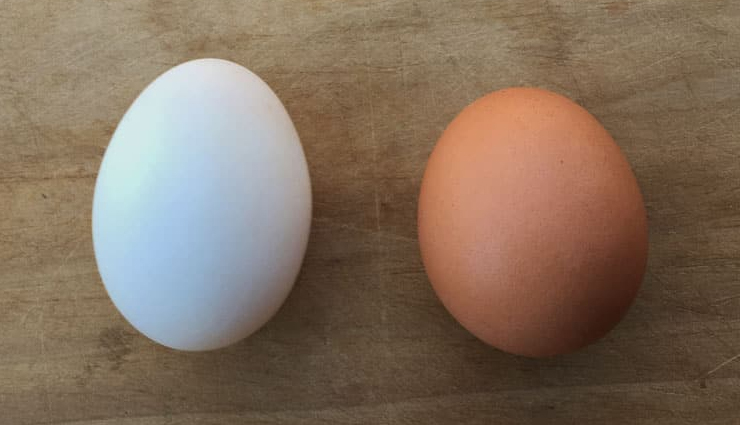- Home›
- Healthy Living›
- Duck Vs. Chicken Eggs: Unveiling The Health Benefits And Potential Side Effects
Duck Vs. Chicken Eggs: Unveiling The Health Benefits And Potential Side Effects
By: Priyanka Maheshwari Tue, 11 July 2023 10:32:51

When it comes to eggs, most people are familiar with chicken eggs, but there is another option to consider: duck eggs. While both types of eggs share similarities in taste and versatility, they also differ in terms of nutritional composition and potential side effects. In this article, we will compare duck and chicken eggs, exploring their health benefits and possible side effects to help you make an informed choice.

Health Benefits of Duck Eggs:
Rich in Protein: Duck eggs are a fantastic source of high-quality protein. They contain more protein per egg compared to chicken eggs, making them an excellent choice for individuals looking to meet their protein needs. Protein is crucial for muscle growth, repair, and overall tissue health.
Abundant in Vitamins and Minerals: Duck eggs are packed with essential vitamins and minerals. They are particularly rich in vitamin B12, which is necessary for red blood cell production and nerve function. Additionally, duck eggs provide significant amounts of vitamins A, D, E, and K, as well as minerals like iron, selenium, and phosphorus.
Omega-3 Fatty Acids: Duck eggs contain higher levels of omega-3 fatty acids compared to chicken eggs. Omega-3s are beneficial for heart health, reducing inflammation, supporting brain function, and promoting healthy skin.
Choline Content: Duck eggs are an excellent source of choline, a nutrient that plays a vital role in brain function, liver health, and metabolism. Choline is involved in various processes within the body, including neurotransmitter production and cell structure maintenance.
Rich in Antioxidants: Duck eggs contain antioxidants such as lutein and zeaxanthin, which are known for their protective effects on eye health. These antioxidants help reduce the risk of age-related macular degeneration and maintain good vision.
Nutrient Density: Duck eggs are highly nutritious and considered more nutrient-dense compared to chicken eggs. They provide a wide range of essential nutrients in a relatively small serving size, making them a beneficial addition to a well-balanced diet.
Side Effects of Duck Eggs:
Allergic Reactions: Duck eggs, like chicken eggs, can cause allergic reactions in some individuals. Egg allergies are relatively common and can range from mild symptoms such as itching or hives to more severe reactions like difficulty breathing or anaphylaxis. If you have a known egg allergy, it's important to exercise caution and avoid consuming duck eggs.
High Cholesterol Content: Duck eggs have a higher cholesterol content compared to chicken eggs. While dietary cholesterol may not have a significant impact on blood cholesterol levels for most people, individuals with pre-existing high cholesterol levels or certain medical conditions should monitor their intake and consult with a healthcare professional for personalized guidance.
Digestive Sensitivity: Some individuals may experience digestive discomfort or gastrointestinal issues after consuming duck eggs. This can be attributed to factors such as the higher fat and protein content of duck eggs. Symptoms may include bloating, gas, diarrhea, or abdominal pain. If you experience these symptoms after eating duck eggs, it's advisable to reduce or eliminate them from your diet.
Salmonella Contamination: As with any type of egg, there is a risk of salmonella contamination. Salmonella is a type of bacteria that can cause foodborne illness. To minimize this risk, it's important to handle and cook duck eggs properly. Store them in the refrigerator, cook them thoroughly until the yolk and white are firm, and avoid consuming raw or undercooked eggs.
Increased Risk of Avidin Toxicity: Duck eggs, like chicken eggs, contain a protein called avidin, which can bind to biotin (a B vitamin) and reduce its availability for the body. However, the risk of biotin deficiency due to avidin in duck eggs is considered low, as the body's requirement for biotin can typically be met through a well-balanced diet.

Health Benefits of Chicken Eggs:
Excellent Source of High-Quality Protein: Chicken eggs are a rich source of high-quality protein, which is essential for building and repairing tissues, supporting muscle development, and maintaining a healthy immune system. The protein in eggs contains all the essential amino acids required by the body.
Essential Nutrients: Eggs are packed with essential nutrients, including vitamins and minerals. They are an excellent source of vitamin B12, which is important for nerve function and the production of red blood cells. Eggs also contain vitamins A, D, E, and various B vitamins, as well as minerals such as iron, selenium, and phosphorus.
Eye Health: Eggs are rich in antioxidants such as lutein and zeaxanthin, which are beneficial for eye health. These compounds help protect the eyes from harmful UV light and reduce the risk of age-related macular degeneration and cataracts.
Brain Function: Eggs are a good source of choline, a nutrient that is essential for brain development, memory, and cognitive function. Choline also plays a role in regulating mood and supporting a healthy nervous system.
Heart Health: Contrary to previous beliefs, moderate egg consumption is now considered safe and may even have a positive impact on heart health. Eggs contain healthy fats, including monounsaturated and polyunsaturated fats, which can help reduce the risk of heart disease when consumed as part of a balanced diet.
Weight Management: Eggs are a satisfying and nutrient-dense food that can aid in weight management. Their high protein content helps promote feelings of fullness and satiety, potentially reducing overall calorie intake.
Bone Health: Eggs are a good source of vitamin D, which is essential for calcium absorption and bone health. Vitamin D, combined with the calcium and phosphorus found in eggs, contributes to the maintenance of healthy bones and teeth.
Skin and Hair Health: The nutrients found in eggs, such as vitamins A, E, and biotin, support healthy skin and hair. These nutrients are important for maintaining the integrity of the skin, promoting cell growth, and enhancing the strength and shine of hair.
Side Effects of Chicken Eggs:
Allergic Reactions: Some individuals may have allergies to chicken eggs. Allergic reactions can range from mild symptoms like itching, hives, or nasal congestion to more severe reactions such as difficulty breathing or anaphylaxis. If you have a known allergy to eggs, it's important to avoid consuming chicken eggs and products containing eggs.
Salmonella Contamination: Like all eggs, chicken eggs can carry the risk of salmonella contamination. Salmonella is a type of bacteria that can cause foodborne illness. To reduce the risk, it is important to handle and cook eggs properly. Store eggs in the refrigerator, cook them thoroughly until the yolk and white are firm, and avoid consuming raw or undercooked eggs.
Cholesterol and Heart Health: Chicken eggs contain cholesterol, but for most healthy individuals, dietary cholesterol does not have a significant impact on blood cholesterol levels. However, individuals with certain medical conditions or pre-existing high cholesterol levels may need to limit their intake. It's advisable to consult with a healthcare professional for personalized guidance.
Egg White Allergy: Some individuals may be specifically allergic to egg whites rather than the entire egg. Egg white allergies are less common than egg allergies, but they can cause similar allergic reactions. If you are allergic to egg whites, you may need to avoid consuming chicken eggs or products that contain egg whites.
Sensitivities and Digestive Issues: Some individuals may experience digestive sensitivities to eggs, such as bloating, gas, or stomach discomfort. This can be due to various factors, including an intolerance or sensitivity to proteins found in eggs. If you experience such symptoms, it may be helpful to limit or avoid eggs and consult with a healthcare professional for guidance.

What is better, duck eggs or chicken eggs? Before you decide which one is better, let us compare the nutritional value of the two eggs
Duck eggs have a slightly different nutritional composition compared to chicken eggs. Here is a breakdown of the approximate nutritional values per 100 grams of raw duck egg:
Calories: 185 kcal
Protein: 12.8 grams
Fat: 13.3 grams
Saturated fat: 3.8 grams
Monounsaturated fat: 5.9 grams
Polyunsaturated fat: 2.7 grams
Carbohydrates: 1.45 grams
Cholesterol: 884 milligrams
Vitamins:
Vitamin A: 380 micrograms
Vitamin D: 2.6 micrograms
Vitamin E: 2.97 milligrams
Vitamin K: 0.3 micrograms
Vitamin B12: 3.78 micrograms
Minerals:
Calcium: 56 milligrams
Iron: 3.49 milligrams
Magnesium: 13 milligrams
Phosphorus: 236 milligrams
Potassium: 176 milligrams
Sodium: 147 milligrams
Zinc: 1.75 milligrams
Selenium: 40.8 micrograms

Here is a breakdown of the approximate nutritional values per 100 grams of raw chicken egg:
Calories: 143 kcal
Protein: 13 grams
Fat: 9.5 grams
Saturated fat: 3.1 grams
Monounsaturated fat: 3.8 grams
Polyunsaturated fat: 1.4 grams
Carbohydrates: 1.1 grams
Cholesterol: 372 milligrams
Vitamins:
Vitamin A: 487 micrograms
Vitamin D: 1.6 micrograms
Vitamin E: 1.03 milligrams
Vitamin K: 0.3 micrograms
Vitamin B12: 1.95 micrograms
Minerals:
Calcium: 56 milligrams
Iron: 1.2 milligrams
Magnesium: 12 milligrams
Phosphorus: 198 milligrams
Potassium: 138 milligrams
Sodium: 141 milligrams
Zinc: 1.3 milligrams
Selenium: 26.5 micrograms





